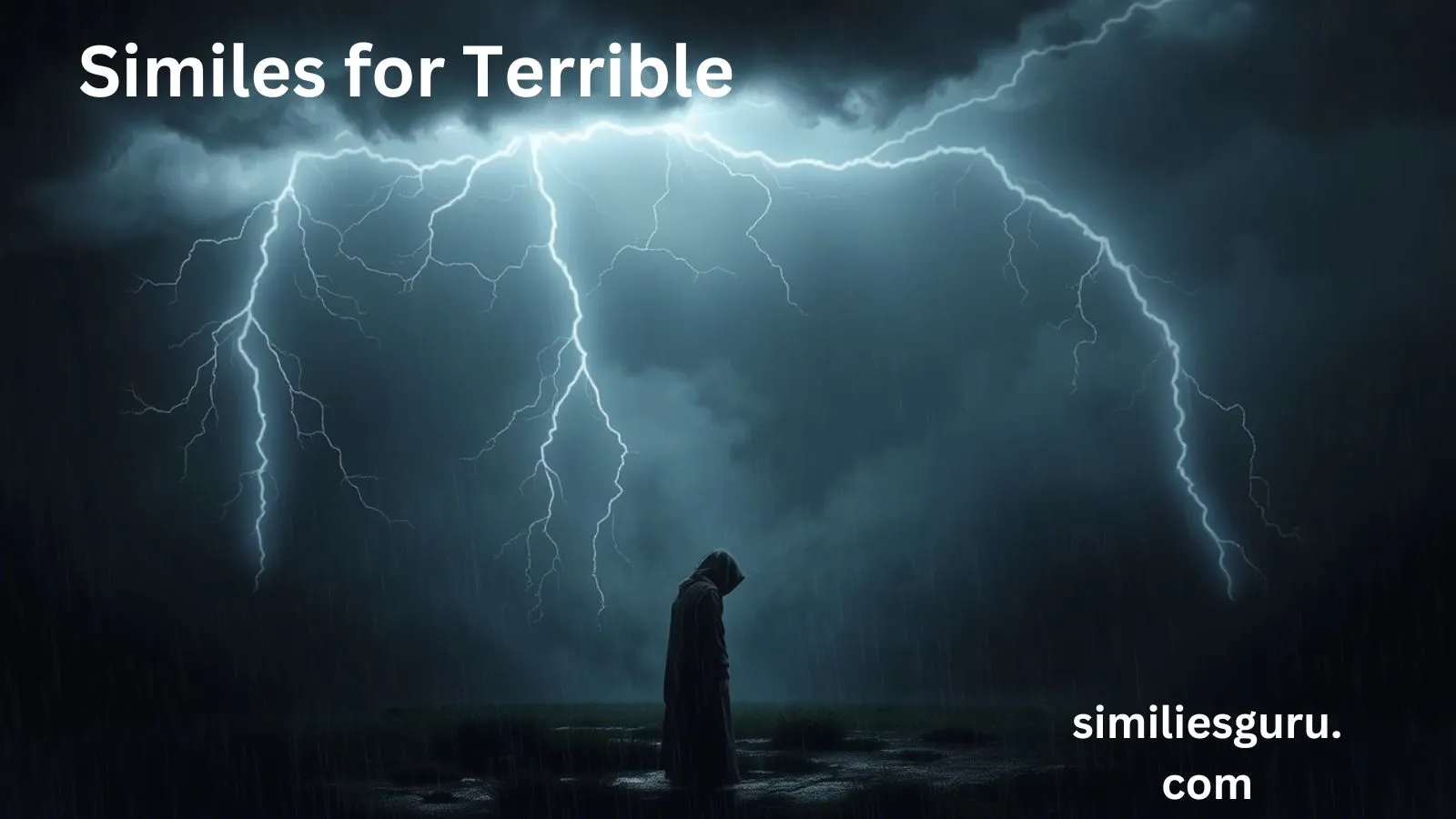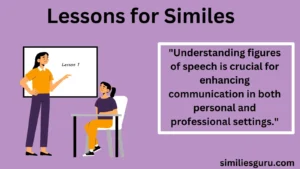Similes are a powerful tool in the English language, allowing writers and speakers to draw vivid comparisons that enhance understanding and evoke emotion. When it comes to expressing something as universally understood as “terrible,” similes can add depth and creativity to your language. This article will explore 15 similes for “terrible,” provide examples of similes in poems for kids, and offer casual alternatives to the phrase. Additionally, we’ll delve into the nuances of tone and context, ensuring you have a variety of options to use in both formal and informal conversations.
Understanding Similes
Before diving into the list, it’s essential to understand what a simile is. A simile is a figure of speech that compares two different things in an interesting way, using the words “like” or “as.” For example, “Her smile was as bright as the sun” is a simile that compares a smile to the sun, emphasizing its brightness.
Similes are commonly used in literature, poetry, and everyday language to make descriptions more vivid and relatable. They can also be a fun way to engage kids in learning about language and creativity.
15 Similes for Terrible
- As terrible as a storm at sea
This simile evokes the image of a violent, uncontrollable storm, emphasizing the chaos and danger associated with something terrible. - Like a nightmare come to life
This comparison suggests that the situation is so bad it feels like a frightening dream has become reality. - As terrible as a broken promise
This simile highlights the emotional devastation that can come from betrayal or disappointment. - Like a shipwreck in a hurricane
This vivid image conveys the complete destruction and hopelessness of a terrible situation. - As terrible as a silent scream
This simile suggests a deep, internal anguish that is so intense it cannot be expressed outwardly. - Like a shadow that never fades
This comparison implies a constant, unrelenting presence of something terrible. - As terrible as a barren wasteland
This simile evokes a sense of desolation and emptiness, emphasizing the lack of hope or life. - Like a dagger to the heart
This comparison suggests that the situation is emotionally painful, as if physically stabbed. - As terrible as a forgotten memory
This simile implies a sense of loss and regret, as if something important has been irretrievably lost. - Like a fire that consumes everything
This comparison emphasizes the destructive and all-encompassing nature of something terrible. - As terrible as a broken mirror
This simile suggests that the situation is not only bad but also irreparable, like a shattered mirror. - Like a ghost that haunts you
This comparison implies that the terrible thing is always present, lingering in the background. - As terrible as a sinking ship
This simile evokes a sense of inevitable doom and helplessness. - Like a poison that spreads slowly
This comparison suggests that the terrible thing is insidious, gradually affecting everything around it. - As terrible as a world without color
This simile emphasizes the bleakness and monotony of a terrible situation, as if all joy and beauty have been drained away.
Examples of Similes in Poems for Kids
Similes are a fantastic way to introduce children to the beauty of language and poetry. Here are a few examples of similes in poems that are perfect for kids:
- “The moon was like a ghostly galleon tossed upon cloudy seas.”
- From The Highwayman by Alfred Noyes
This simile compares the moon to a ghostly ship, creating a vivid and eerie image.
- From The Highwayman by Alfred Noyes
- “My love is like a red, red rose.”
- From A Red, Red Rose by Robert Burns
This classic simile compares love to a beautiful rose, emphasizing its beauty and fragility.
- From A Red, Red Rose by Robert Burns
- “The stars were like twinkling diamonds in the sky.”
- From Twinkle, Twinkle, Little Star
This simile compares stars to diamonds, highlighting their brightness and value.
- From Twinkle, Twinkle, Little Star
- “Her smile was as warm as the sun on a summer’s day.”
- From The Sun by Mary Oliver
This simile compares a smile to the sun, emphasizing its warmth and positivity.
- From The Sun by Mary Oliver
- “The wind was like a wolf howling in the night.”
- From The Wind by Robert Louis Stevenson
This simile compares the wind to a wolf, creating a sense of wildness and danger.
- From The Wind by Robert Louis Stevenson
Casual Alternatives to the Phrase “Similes for Terrible”
While similes are a great way to describe something terrible, there are also more casual, everyday phrases that can convey a similar meaning. Here are some alternatives:
- “It was a total disaster.”
This phrase is straightforward and emphasizes the severity of the situation. - “It was a nightmare.”
This casual expression suggests that the situation was extremely unpleasant or stressful. - “It was a train wreck.”
This phrase implies that the situation was chaotic and out of control. - “It was a complete mess.”
This casual alternative emphasizes the disorder and confusion of the situation. - “It was a disaster waiting to happen.”
This phrase suggests that the terrible outcome was inevitable. - “It was a real downer.”
This casual expression implies that the situation was depressing or disappointing. - “It was a total flop.”
This phrase is often used to describe something that failed miserably. - “It was a bust.”
This casual alternative suggests that the situation was unsuccessful or disappointing. - “It was a letdown.”
This phrase implies that the situation did not meet expectations. - “It was a bummer.”
This casual expression suggests that the situation was unfortunate or disappointing. - “It was a catastrophe.”
This phrase emphasizes the severity and scale of the disaster. - “It was a fiasco.”
This casual alternative implies that the situation was a complete failure.
12 Texting Examples
In today’s digital age, texting has become a primary mode of communication. Here are 12 user-friendly texting examples that incorporate similes and casual alternatives for “terrible,” optimized for Google and suitable for various contexts:
- “That meeting was as terrible as a root canal. 😩”
- This text uses a simile to compare the meeting to a painful dental procedure.
- “The traffic today was a total nightmare. 🚗💨”
- This text uses a casual alternative to describe the bad traffic.
- “My day was like a sinking ship. 🚢”
- This text uses a simile to convey a sense of inevitable doom.
- “That movie was a complete flop. 🎬”
- This text uses a casual alternative to describe a disappointing movie.
- “The weather is as terrible as a storm at sea. 🌧️”
- This text uses a simile to emphasize the bad weather.
- “This week has been a real downer. 😔”
- This text uses a casual alternative to describe a depressing week.
- “That party was like a train wreck. 🎉”
- This text uses a simile to describe a chaotic and unsuccessful party.
- “The food at that restaurant was a total bust. 🍴”
- This text uses a casual alternative to describe disappointing food.
- “My phone battery is as terrible as a broken promise. 📱”
- This text uses a simile to emphasize the unreliability of the phone battery.
- “That game was a complete mess. 🎮”
- This text uses a casual alternative to describe a disorganized game.
- “The service at that hotel was a catastrophe. 🏨”
- This text uses a casual alternative to emphasize the poor service.
- “That presentation was like a dagger to the heart. 💔”
- This text uses a simile to describe an emotionally painful experience.
Nuances of Tone and Context
When choosing the best way to express that something is terrible, it’s essential to consider the tone and context of the situation. Here are some tips:
- Formal Settings: In formal settings, such as a business meeting or academic paper, it’s best to use more sophisticated language. Similes like “as terrible as a storm at sea” or “like a nightmare come to life” can add depth and professionalism to your description.
- Informal Settings: In casual conversations with friends or family, you can use more relaxed language. Phrases like “it was a total disaster” or “it was a nightmare” are perfectly acceptable and convey the same meaning in a more conversational tone.
- Texting: When texting, brevity is key. Using short, impactful phrases like “total flop” or “complete mess” can quickly convey your message without unnecessary elaboration.
- Poetry and Literature: In creative writing, similes are a powerful tool to evoke emotion and create vivid imagery. Using similes like “as terrible as a broken mirror” or “like a shadow that never fades” can add depth and complexity to your writing.
- Teaching Kids: When introducing similes to children, it’s important to use simple, relatable comparisons. Similes like “the stars were like twinkling diamonds” or “her smile was as warm as the sun” are easy for kids to understand and can spark their creativity.
Conclusion
Similes are a versatile and creative way to describe something as universally understood as “terrible.” Whether you’re writing a poem, having a casual conversation, or sending a quick text, similes and casual alternatives can help you convey your message with clarity and impact. By understanding the nuances of tone and context, you can choose the best way to express well wishes or describe a challenging situation. With the examples and tips provided in this article, you’ll be well-equipped to use similes effectively in any setting.



